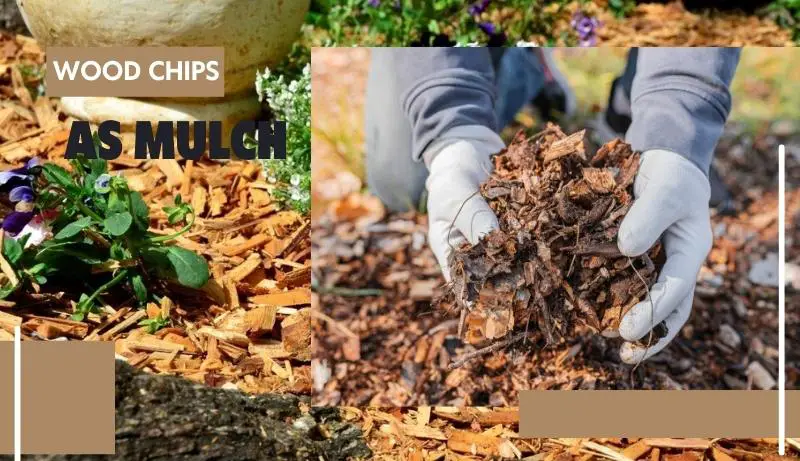Wood chips are the part and parcel of a healthy garden. A professional gardener can’t skip the wood chips due to its natural benefits.
Though people are using wood chips for various purposes, the most usable and beneficial way is as a mulch. And wood chips are the best mulch for trees and shrubs except for some particular plants.
A study of Washington State University shows that wood chips are one of the best mulches and a significant component of environmentally sustainable gardening.
So, we have designed the article to let you know more about wood chips as mulch and the benefits of using mulches. Indeed, it will help you to choose the right kind of wood chips for your garden.
Let’s get started.
What is mulch?
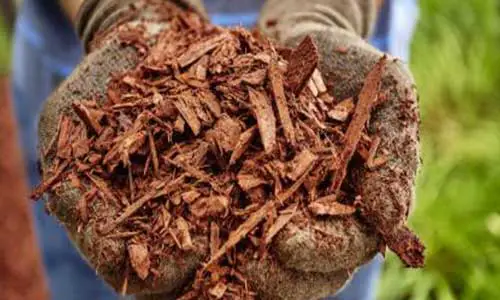
Mulch is a layer of material (usually organic) that is spread over the surface of the soil. Its main purpose is to conserve moisture in the soil, but it also helps to suppress weeds and can improve the overall appearance of your garden beds. There are many different types of mulch available, so you can choose one that best suits your needs.
Organic mulches, such as bark chips or shredded leaves, will break down over time and add nutrients to the soil as they do so. Inorganic mulches, such as gravel or stones, will not break down and will need to be replaced periodically. Whichever type of mulch you choose, make sure to apply it thickly (about 5cm/2in) and keep it away from the base of your plants to prevent it from rotting their stems.
How is wood mulch made?
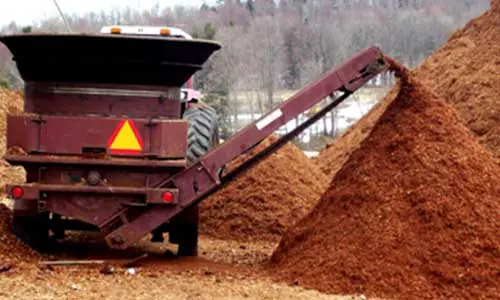
Wood mulch is made from wood chips or shavings that are left over from lumbering operations. The wood is chipped or shaved into small pieces, then screened to create a uniform product. Wood mulch is an excellent way to add organic matter to your garden, as well as improve the appearance of your landscape. Mulch also helps to suppress weeds and keep the soil moist.
What are there different kinds of wood mulch?
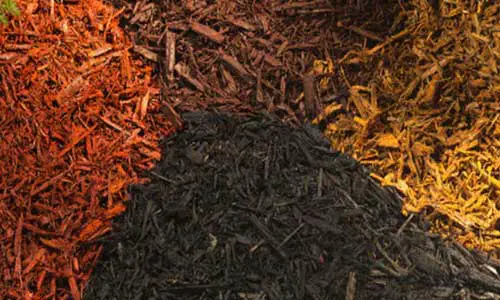
Wood mulch comes in many different varieties. The most common type is made from shredded or chipped wood, but there are also types made from bark, leaves, and even recycled paper. While each type of mulch has its own set of benefits, they all share one common goal: to protect your plants and keep your garden looking great. Here’s a closer look at the different types of wood mulch:
Shredded wood: This type of mulch is made from shredded or chipped wood. It’s a great choice for gardens because it breaks down slowly, providing nutrients to your plants over time. It’s also very effective at controlling weeds and keeping the soil moist.
Bark: Bark mulch is made from the bark of trees. It’s a great choice for gardens because it’s long-lasting and it provides nutrients to your plants as it breaks down. Bark mulch is also effective at controlling weeds and keeping the soil moist.
Leaves: Leaf mulch is made from leaves that have been shredded or chipped. It’s a great choice for gardens because it’s rich in nutrients and it breaks down quickly, providing your plants with a quick source of food. Leaf mulch is also effective at controlling weeds and keeping the soil moist.
Recycled paper: Recycled paper mulch is made from recycled paper that has been shredded or chipped.
It’s a great choice for gardens because it’s environmentally friendly and it breaks down quickly, providing your plants with a quick source of food. Recycled paper mulch is also effective at controlling weeds and keeping the soil moist.
Benefits of Wood Chips as Mulch
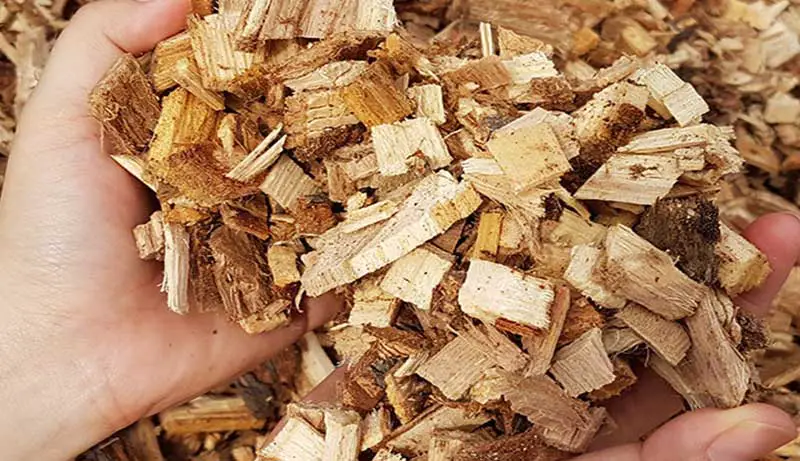
- Using wood chips can improve the soil structure. And the impact is quite sustainable for long time soil protection.
- After using the wood chips, it can transfer the gas quite effortlessly throughout the soil. Thus, soil has a better way to circulate the gas easily.
- Reducing temperature is one of the most beneficial factors of wood chips. Whatever the outside temperature, it provides a balanced temperature to the soil and plants.
- Wood chips usually contain barks, chips and leaves. Day after day, these elements melt away to soil, as a result, it prevents soil erosion and soil compaction.
- Wood chips provide better water holding capacity. Besides, it releases the water slowly throughout the seasons.
- Another form of using wood chips is a weed Wood chips help to prevent unwanted weeds in the ground.
- Wood chips from cedar and pine trees have a natural impact of preventing insects and some pathogens. That means it works as pest repellents as well.
Pros And Cons Of Wood Chip Mulch!
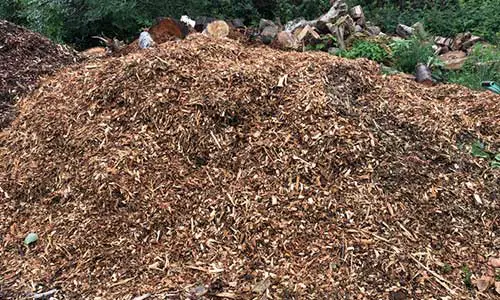
There are a few things to consider before using wood chip mulch in your garden. One of the Pros is that it suppresses weeds and helps your plants grow. It also breaks down slowly, providing nutrients to your plants as it does.
One of the Cons of wood chip mulch is that it can attract termites and other pests if not used correctly. Also, it can rob your soil of nitrogen if used too heavily. Be sure to do your research before using wood chip mulch in your garden!
Pros:
- Suppresses weeds
- Help your plants grow
- Breaks down slowly, providing nutrients to your plants as it does
- Can attract termites and other pests if not used correctly
- Can rob your soil of nitrogen if used too heavily
How long do Wood Chips Last as Mulch?
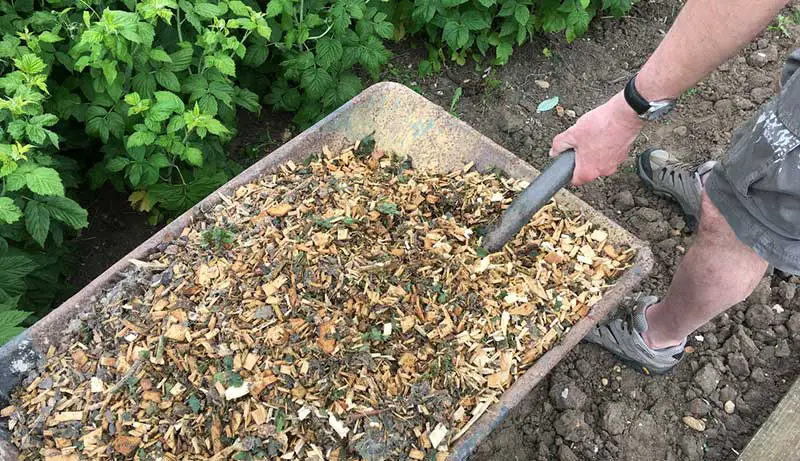
If you use the best wood chips as mulch then it will last a maximum five to seven years. And if you bark then it will last seven to ten years. However, wood shaving lasts less longer than the wood chips and barks.
Is wood chip mulch a fire hazard?

The thicker textured wood chips are least susceptible to fire. Plus, the most wood barks, which are common forms of mulch, are the least flammable. However, wood shaving is too lightweight and more susceptible to fire. Plus, rubber mulch is mostly fire hazard mulch.
Wood mulch vs wood chips?
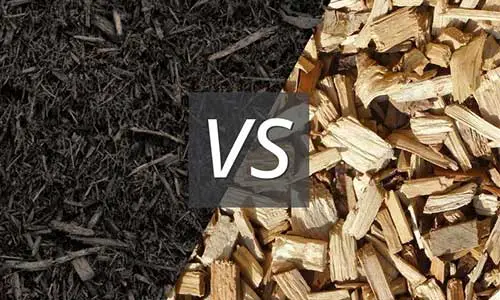
When it comes to wood mulch vs wood chips, there are a few key differences that you should be aware of. Wood mulch is typically made from smaller pieces of wood that have been shredded or chipped, while wood chips are usually larger and more coarse.
Wood mulch will break down over time and provide nutrients for your plants, while wood chips will not. Wood chips can be used as a temporary ground cover or as part of a landscaping project, but they will need to be replaced more often than wood mulch. When it comes to price, wood chips are typically cheaper than wood mulch.
Should I remove old mulch?
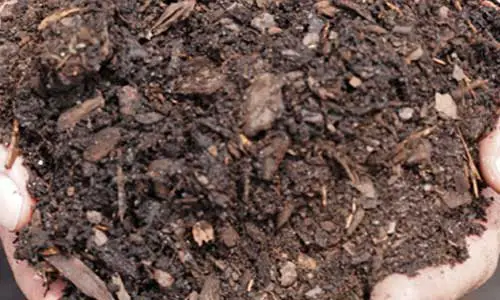
Not necessary. Old mulch isn’t harmful for the garden or soil, instead it is quite beneficial for the soil. Old mulch slowly breaks down, and it provides beneficial nutrients to the soil. Besides, the old mulch enhances the soil microbes’ activities.
What is Organic mulch & Types of Organic Mulch?
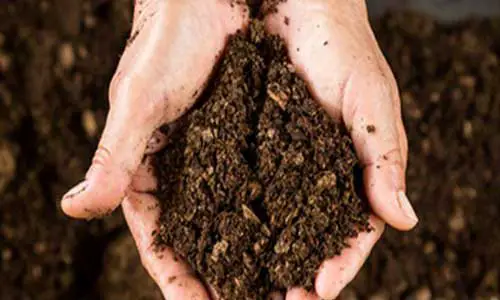
Organic mulch is a great way to add nutrients and improve the health of your soil. It can also help to suppress weeds and keep your plants healthy. There are many different types of organic mulch available, so you can choose the one that best suits your needs. Here are some of the most popular types of organic mulch:
Compost: Compost is a great all-purpose mulch that can be used on almost any type of plant. It helps to improve drainage and add nutrients to the soil.
Wood chips: Wood chips make an excellent mulch for gardens and landscapes. They help to suppress weeds and retain moisture in the soil.
Straw: Straw is a good choice for mulching around delicate plants. It helps to keep the soil moist and prevents erosion.
Grass clippings: Grass clippings can be used as mulch, but they should be fresh and free of chemicals. They will help to add nutrients and improve drainage in the soil.
Leaves: Leaves make a great mulch for gardens and landscapes. They help to improve drainage and add nutrients to the soil.
Organic mulch is a great way to improve the health of your soil and plants. There are many different types of organic mulch available, so you can choose the one that best suits your needs.
What’s the difference between compost and wood mulch?
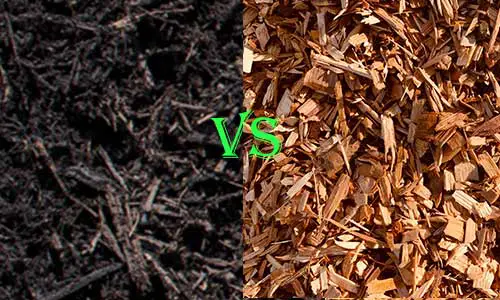
One of the most common questions we get asked here at The Garden Fixer of USA is “What’s the difference between compost and wood mulch?” It’s a great question and one that has a bit of a complex answer.
In short, the main difference between compost and wood mulch is that compost is organic matter that has been broken down by microbes, while wood mulch is simply shredded wood.
Compost is made up of decomposing organic matter, such as leaves, grass clippings, and food scraps. This organic matter is broken down by microbes, which release nutrients that are beneficial to plants.
Wood mulch, on the other hand, is simply shredded wood. It does not provide any nutritional benefits to plants and is mainly used for aesthetics or to control weeds.
While wood mulch can be made from composted wood, it is not the same thing as compost. Compost is a nutrient-rich soil amendment that can be used to improve the health of your plants, while wood mulch is simply a decorative or weed-control measure.
So, when you’re choosing between compost and wood mulch, make sure you know what your goal is. If you’re looking to improve the health of your plants, go with compost. If you’re just looking for a decorative touch or weed control, wood mulch will do the trick.
Can I Use Wood Chip Mulch From a Tree Service?
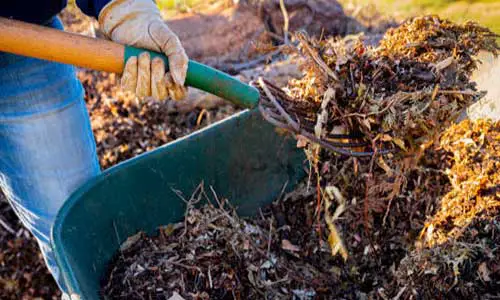
If you’re wondering whether or not you can use wood chip mulch from a tree service, the answer is yes! This type of mulch is perfectly safe to use in your garden, and it can actually be quite beneficial.
Wood chip mulch helps to suppress weeds, retain moisture in the soil, and protect plants from extreme temperatures. It’s also an excellent way to add organic matter to your garden. So if you have access to wood chips from a tree service, don’t hesitate to put them to good use in your garden!
Where To Use Wood Chips?
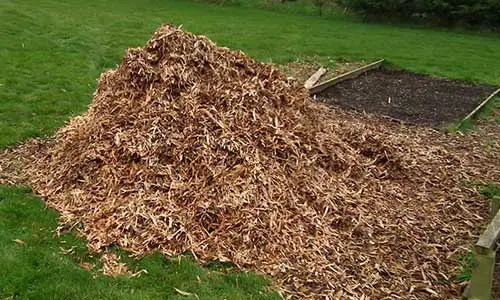
Wood chips can be used for a variety of purposes, from providing a natural mulch for your garden to serving as fuel for smoking meats. Here are some of the most popular uses for wood chips:
Mulching: Wood chips make an excellent mulch that helps retain moisture and prevent weeds. Simply spread a layer of chips around your plants, being sure to leave a few inches between the chips and the base of the plant.
Composting: Wood chips are a great addition to any compost pile. They help improve drainage and aeration while also providing essential nutrients for your plants. Simply mix wood chips in with your other organic matter, such as kitchen scraps and yard waste.
Smoking meat: Wood chips are often used as fuel for smoking meat. Different types of wood will impart different flavors to the meat, so be sure to experiment with different kinds to find the taste you like best.
Landscaping: Wood chips can be used in a variety of landscaping applications. They can be used as a ground cover, added to paths and walkways, or even used to create artificial hills and mountains in your yard. The possibilities are endless!
Fresh Wood Chips for Mulch – Harmful or Good?
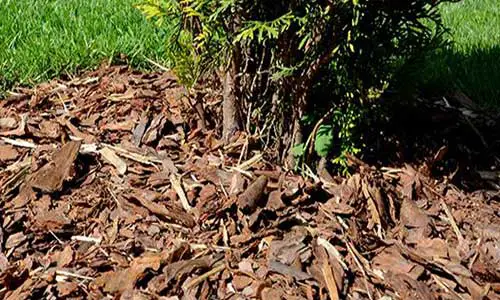
Are fresh wood chips for mulch harmful or good? This is a question that many gardeners have, especially those who are looking for an alternative to traditional mulches like bark chips. Fresh wood chips can be an excellent mulch choice for your garden, but there are a few things you should keep in mind before using them.
Fresh wood chips can be high in carbon, which can lead to them breaking down quickly and becoming compacted. This can create a problem if you live in an area with heavy rains, as the compacted mulch will not allow water to penetrate the soil. Fresh wood chips also need to be replenished more often than other types of mulch, so they may not be the best choice if you’re looking for a low-maintenance option.
Fresh wood chips can also be a good choice for mulching around trees and shrubs. The carbon in the wood chips will help to fertilize the soil and encourage beneficial microbial activity. Fresh wood chips can also help to suppress weeds, which is always a bonus in the garden!
If you do decide to use fresh wood chips for mulch, make sure to choose a species that is not known to be invasive in your area. Some common invasive species of tree include black walnut, mimosa, and ailanthus.
In general, fresh wood chips can be a great mulch choice for your garden. Just make sure to do your research and choose a species that is not known to be invasive in your area. With a little care, your garden will thrive with fresh wood chips!
What to do with wood chips from chipper?
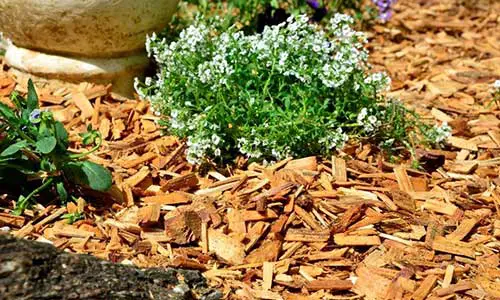
As you may know, a chipper is a machine that is used to shred wood. Wood chips from a chipper can be used in many different ways. Here are some ideas of what to do with wood chips from a chipper:
- Use them as mulch in your garden. This will help prevent weeds from growing and will also help retain moisture in the soil.
- Use them as animal bedding. Wood chips make a great bedding material for chickens, rabbits, and other small animals.
- Use them as fuel for a fire. If you have a wood-burning stove, you can use wood chips as fuel.
- Use them in compost. Wood chips will break down over time and can add valuable nutrients to your compost pile.
- Use them as a walking surface. Wood chips make a great walking surface for paths and walkways.
- Use them in planters. Wood chips can be used to line the bottom of planters and flower pots.
As you can see, there are many different ways to use wood chips from a chipper. So, what will you do with yours?
What kind of wood chips are bad for gardens?
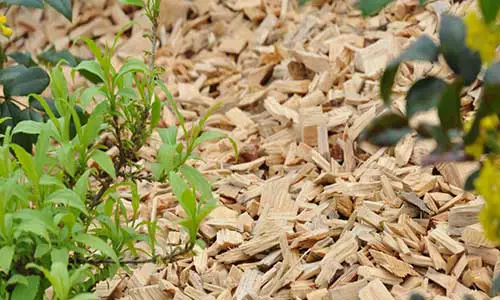
There are a few different types of wood chips that can be bad for gardens. Redwood and cedar chips can contain high levels of tannins, which can make the soil acidic and stunt the growth of plants.
Pine needles can also be detrimental to gardens, as they release large amounts of pine oils into the soil which can be toxic to plants. Finally, treated wood chips should never be used in gardens, as the chemicals used to treat the wood can leach into the soil and potentially harm plant life.
Wood chips for garden!
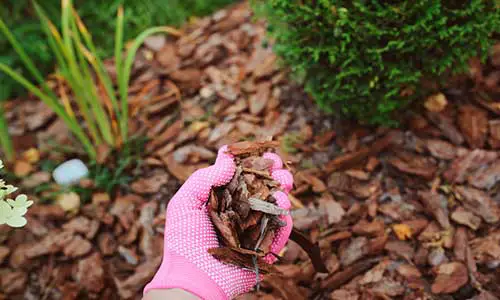
If you’re looking for a way to spruce up your vegetable garden, wood chip mulch is a great option. This type of mulch is made from shredded wood chips and can provide a number of benefits to your plants.
One of the biggest advantages of using wood chip mulch is that it helps to improve the soil quality. As the chips break down over time, they add organic matter to the soil which can help to improve drainage and aeration. This can be especially beneficial in clay soils.
Another benefit of wood chip mulch is that it helps to suppress weeds. By creating a barrier between the soil and the sun, weed seeds are less likely to germinate. This can save you time and energy in the long run.
In addition, wood chip mulch can help to keep the soil moist. This is especially beneficial during hot summer months when the sun can quickly dry out the soil.
If you’re looking for a way to improve your vegetable garden, wood chip mulch is a great option. This type of mulch can provide a number of benefits to your plants, including improved soil quality, weed suppression, and moisture retention.
Wood chips can also be used around the base of trellises to help retain moisture. If you’re interested in setting up a trellis in your garden, check out our guide on how to attach a trellis to a brick wall without drilling.
Does fresh mulch hurt plants?
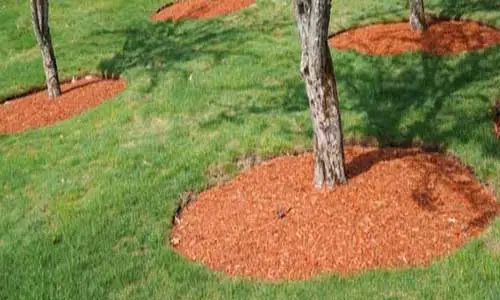
If you’re wondering whether fresh mulch can hurt your plants, the answer is generally no. However, there are a few things to keep in mind when using fresh mulch, as it can sometimes have negative effects.
For one, if the mulch is too thick, it can smother your plants and prevent them from getting the oxygen they need. This is most likely to happen if you apply the mulch directly on top of existing vegetation, rather than around the base of plants.
If you’re concerned about using fresh mulch, it’s always best to consult with a gardening expert before proceeding. They can help you determine whether it’s the right choice for your garden and offer tips on how to use it safely.
How & Why I Use Wood Chip Mulch in the Garden!
Frequently Asked Questions & Answers
1. What are wood chips?
Wood chips are small pieces of wood that are usually left over from sawing or chipping larger pieces of wood. Wood chips can be used as mulch in gardens and landscaping.
2. What are the benefits of using wood chips as mulch?
Some benefits of using wood chips as mulch include:
- Weed suppression: Wood chips help to suppress weeds by blocking sunlight and preventing weed seeds from germinating.
- Moisture retention: Wood chips help to retain moisture in the soil, which is beneficial during periods of drought.
- Soil erosion control: Wood chips help to prevent soil erosion by holding the soil in place and preventing runoff.
- Temperature control: Wood chips can help to regulate soil temperature, keeping the soil cooler in summer and warmer in winter.
3. How do I apply wood chips as mulch?
Applying wood chips as mulch is relatively simple. First, clear away any existing vegetation or debris from the area where you will be applying the mulch. Next, spread a layer of wood chips over the soil, taking care to evenly distribute them. Finally, water the area well to help the wood chips bond with the soil.
4. How often should I reapply wood chip mulch?
It is generally recommended that you reapply wood chip mulch every year or two. However, this may vary depending on the climate and the type of wood chips you are using.
5. Are there any drawbacks to using wood chips as mulch?
One potential drawback of using wood chips as mulch is that they can attract insects and other pests. Wood chips also decompose over time, so they will need to be replaced more frequently than other types of mulch.
6. What are some alternative types of mulch?
Some alternative types of mulch include:
- Bark chips: Bark chips are a good alternative to wood chips, as they are less likely to attract insects and other pests.
- Coconut husks: Coconut husks make an excellent mulch, as they are very effective at suppressing weeds and retaining moisture.
- Peat moss: Peat moss is another good alternative to wood chips, as it is also effective at suppressing weeds and retaining moisture.
7. Where can I buy wood chips for mulching?
Wood chips for mulching can be purchased from most garden centers and landscaping supply stores. You can also find them online from a variety of retailers.
Final Words
Although there are different sorts of mulch for gardening such as leaves, rubber mulch, grass clipping, sawdust, and so on, the most popular and beneficial mulch for trees and shrubs is wood chips.
As you have already known the numerous benefits of wood chips from the above discussion, we hope you always prefer wood chips as mulch for your garden and find the right kind of mulch.

David, the founder of The Garden Fixer, started with a passion for gardening in 2012. He has continued his passion for gardening and desire to improve his skills and wanted to share his journey and helpful knowledge with other like-minded individuals.
He launched The Garden Fixer as an outlet for those interested in learning more about Gardening in hopes they can take what they learn and apply it for themselves!
